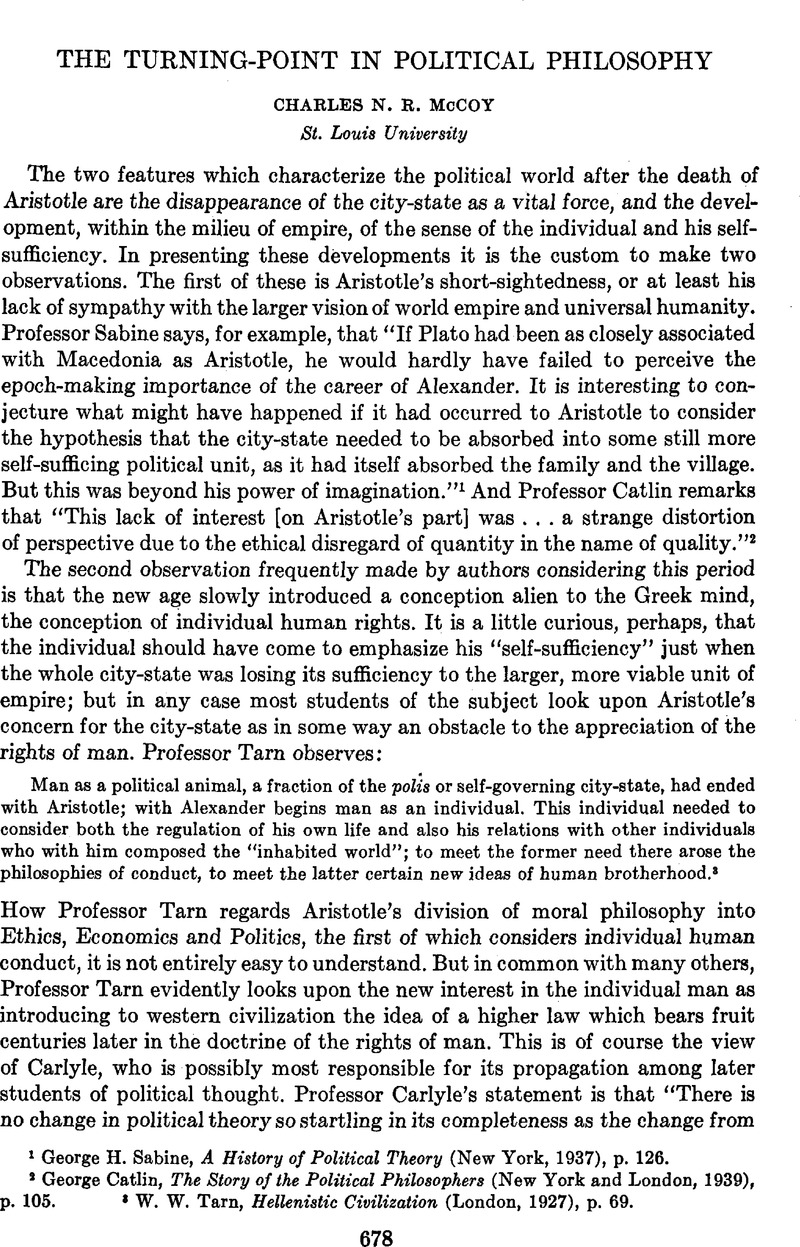Article contents
The Turning-Point in Political Philosophy
Published online by Cambridge University Press: 02 September 2013
Abstract

- Type
- Notes and Memoranda
- Information
- Copyright
- Copyright © American Political Science Association 1950
References
1 Sabine, George H., A History of Political Theory (New York, 1937), p. 126Google Scholar.
2 Catlin, George, The Story of the Political Philosophers (New York and London, 1939), p. 105Google Scholar.
3 Tarn, W. W., Hellenistic Civilization (London, 1927), p. 69Google Scholar.
4 Carlyle, R. W. and Carlyle, A. J., A History of Medieval Political Theory in the West (Edinburgh and London, 1930), Vol. 1, p. 9Google Scholar.
5 Ethics, Bk. VIII, Ch. 1, 1155a, 20.
6 Professor Carlyle admits this difficulty but then, it seems, “ventures to think” that it is not one: “There can be little doubt that … we find Cicero … speaking under the influence partly at least of the Aristotelian principle of the fundamental distinction in human nature.… But we venture to think that such passages do not … weaken the effect of those which we have already discussed.” Op. cit., Vol. 1, p. 12.
7 Not only is it necessary to isolate the new doctrine from the matrix of old classical Greek ideas, but it is necessary to see that the very formality of the new doctrine is grasped completely only against very important elements of classical Greek philosophy. Professor Cassirer, for example, is one of the very few who has not lost himself in ambiguities on this question, but he seems to have been quite unmindful of the necessity, if the full significance of the new doctrine is to be made manifest, of seeing it precisely in its differences. See his The Myth of the State (New Haven, 1946), pp. 100–105Google Scholar.
8 Metaphysics, Bk. XII, Ch. 10, 1075a, 12.
9 Ibid., Ch. 10, 1075a, 20.
10 Ibid., Bk. I, 982b, 20.
11 Op. cit., p. 114.
12 Ethics, Bk. I, Ch. 10, 1101a, 18.
13 Summa Theologica I–II, Q. 61, Art. 5.
14 Ethics, Bk. VII, Ch. 14, 1154b, 26.
15 Ethics, Bk. V, Ch. 7, 1134b, 20.
16 Politics, Bk. I, Ch. 3, 1254a, 16.
17 Op. cit., pp. 101–102.
18 Ethics, Bk. VI, Ch. 7, 1141a. 20.
19 Ibid., Bk. X, Ch. 7, 1177b, 26–35.
20 It is beyond the intention of this paper to speak of the relation of Stoic ideas to Christian doctrine, but it is necessary to point out that the quite crude identification of Stoic principles with Christian doctrine is part of the impossible ambiguity in which this period in political philosophy is shrouded. It should be clear that if we isolate out of the incoherence of later Stoicism the formality of its point of view, by which it distinguishes itself from Aristotle, then the substance of the Stoic doctrine is the self-dependence of the reason of the universal Man, whose dignity consists in the very affirmation of his complete self-dependence. And this of course is clearly against the whole burden of the Christian message. It is true that St. Augustine and the other Church Fathers were greatly affected by their reading of the Stoics, and particularly of Cicero, but it must be remembered that Cicero's literary exposition of Stoic ethical teaching already reflects the revision of Stoicism back in the direction of Plato and Aristotle. When St. Thomas Aquinas, in the thirteenth century, comes to write his treatise on the moral virtues he does two significant things: first, he cites St. Augustine's opinion that the Stoics and Peripetetics differ more in word than in opinion (which would be quite true of the revised Stoicism), and then he goes on to show that the verbal difference is nonetheless rooted in a real inadequacy of analysis. Summa Theologica, I–II, Q, 59, Art. 2. The Stoic position on the role of passion in virtue is capable of a correct understanding, but the best way of understanding it correctly is by making use of Aristotle's Ethics. Similarly the Stoic doctrine of the fundamental equality of men is verbally good, but Aristotle's doctrine of the fundamental equality of men has the advantage of being intelligible. And it is instructive to observe that when St. Thomas Aquinas treats of the virtues which relate to Justice, he interprets the Roman virtue of humanitas—which is perhaps the most finished expression of the substance of the new natural law doctrine—not in its characteristically Stoic meaning but in the sense of Aristotle's friendship. Ibid., II–II, Q. 80. Finally, the Scriptures themselves make clear how different from the Roman virtue of humanitas was the Christian message:
Apparuit benignitas, et humanitas
Salvatoris nostri Dei: non ex operibus
justitiae, quae fecimus nos, sed secundum
suam misericordiam salus fecit.
Titus 3, 4–5.
21 Op. cit., Vol. 1, p. 9.
22 Op. cit., p. 425.
23 Op. cit., p. 172.
24 Ibid., pp. 172–173.
25 Kant, Prolegonema, Sec. 36.
26 Philosophy of History (London, 1894), pp. 460–466Google Scholar.
27 de Koninck, Charles, De la Printouts du Bien Commun (Quebec, 1943), pp. 164–166Google Scholar.
28 Capital (translated from the German ed. of Untermann, Ernest, Chicago, 1909), Vol. 3, p. 954Google Scholar.
29 Heine, Heinrich, Religion and Philosophy in Germany (London, 1891), pp. 158–162Google Scholar.
- 1
- Cited by



Comments
No Comments have been published for this article.